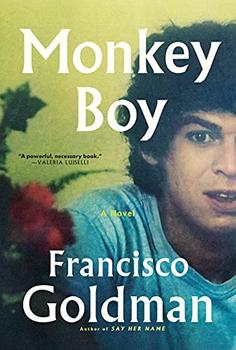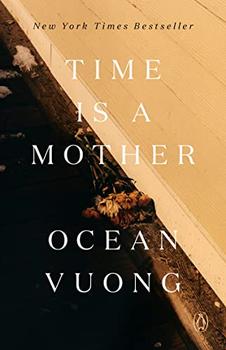Summary | Excerpt | Reviews | Beyond the book | Read-Alikes | Genres & Themes | Author Bio

Francisco Goldman's Monkey Boy exists in the liminal space between memoir and fiction. Like Goldman himself, son of a Jewish immigrant father from Ukraine and a Catholic immigrant mother from Guatemala, his writing defies easy categorization, landing in the zone of autobiographical fiction. "I made things up in order to be able to tell the truth," Goldman told the Paris Review's Lila Byok. "...Once you claim that you are writing a narrative purely from memory you are already in the realm of fiction."
The book's semi-eponymous narrator is Francisco Goldberg — Frankie — a 49-year-old journalist-cum-novelist; its title comes from the name given to him by childhood bullies. Frankie has recently returned to New York City from Mexico City, where he was living, because of death threats he received following publication of his book about the murder of a Guatemalan bishop, a murder with links to the highest echelons of the country's government. On its face, Monkey Boy is the story of a five-day trip to Boston; inwardly, it is a far-ranging quest to come to terms with childhood, family history and the multifaceted inheritance of violence that shaped the narrator's life.
The story opens as Frankie prepares for a train trip to see his mother, whom he calls Mamita, in a nursing home in the suburbs of Boston, the landscape of his childhood. He is at a turning point in his life. His novel about José Martí, Cuban poet and revolutionary, is about to be published, and he is hoping that after several romantic failures, a tentative new relationship will provide the fulfillment that has so far eluded him.
Mamita has begun a gradual descent into dementia, and Frankie wants to connect with her while she is still lucid. She is reluctant because she's afraid her confidences will end up in a novel. When Frankie's first book was published, she framed the paragraph from the copyright page that says, "This is a work of fiction," and hung it on the wall in her front hall. He also plans to connect with some of the influential women in his life: a high school sweetheart, his Guatemalan au pair, and his sister, with whom he has a troubled relationship. He is looking for a way into a past that has left him feeling caught between worlds, unconnected and invisible. He hopes that by understanding his past, he will be able to look toward a new future.
Goldman weaves a complex braid of the present, memory and gritty political commentary. The prose drifts in short vignettes between stream of consciousness descriptions of the scenery beyond the train window — "a CasparDavidFriedrich graveyard with crooked gravestones, bare, black, twisted trees" — journeys through Goldberg's childhood — "I remember no part of my life more vividly than my fear of my father" — and back through the histories that shaped his parents' lives as immigrants in an unfamiliar and sometimes hostile country. With understated, razor-sharp language, Frankie recalls a morning walk with his father to a Jewish bakery:
Ricky Rossi from my sixth-grade class, sneering baby face in a bomber hat with hanging earflaps. Pitching arm cocked as if about to hurl another [snowball] as he lightly skipped backward on the snow-covered sidewalk, he shouted, Jew! … A Norman Rockwell painting, quaint New England town square in prettily falling snow, rascally boys being boys.
Later, he recalls a moment of racial animosity between his mother and a traffic cop:
Oh yeah, Yolanda? So where's ya Chiquita Banana hat? … That was one historically literate cop, though, to make that connection between my mother's country and the originally Boston-based fruit company that gave birth to Chiquita and helped bring years of military dictatorship and slaughter to her country.
During his early life, Goldberg/Goldman bounced between Boston and Guatemala City. His experiences in Guatemala instilled in him a strong sense of social justice and led to a 10-year career covering the Guatemalan Civil War (see Beyond the Book) and later, the child abductions of Argentina's Dirty War.
In his writing, Goldman exposes the underbelly of a complex web of brutality, from intimate family violence to the racism and bullying of a working-class Boston suburb, to the global violence of colonial oppression. Yet, as searing and unflinching as the novel is, it is also a work of tenderness and compassion. We fall in love with the characters, as flawed as they are, because Goldman paints them with a shining and necessary humanity. At a time when xenophobia and racial and ethnic violence are on the rise, Monkey Boy offers both a glimmer of hope for the future and a stunning read.
![]() This review was originally published in The BookBrowse Review in June 2021, and has been updated for the
May 2022 edition.
Click here to go to this issue.
This review was originally published in The BookBrowse Review in June 2021, and has been updated for the
May 2022 edition.
Click here to go to this issue.

If you liked Monkey Boy, try these:

by Ocean Vuong
Published 2025
Ocean Vuong returns with a bighearted novel about chosen family, unexpected friendship, and the stories we tell ourselves in order to survive.

by Ocean Vuong
Published 2023
The highly anticipated collection of poems from the award-winning writer Ocean Vuong.
Your guide toexceptional books
BookBrowse seeks out and recommends the best in contemporary fiction and nonfiction—books that not only engage and entertain but also deepen our understanding of ourselves and the world around us.